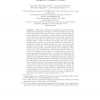Free Online Productivity Tools
i2Speak
i2Symbol
i2OCR
iTex2Img
iWeb2Print
iWeb2Shot
i2Type
iPdf2Split
iPdf2Merge
i2Bopomofo
i2Arabic
i2Style
i2Image
i2PDF
iLatex2Rtf
Sci2ools
ICALP
2009
Springer
2009
Springer
Maximum Bipartite Flow in Networks with Adaptive Channel Width
Traditionally, combinatorial optimization problems (such as maximum flow, maximum matching, etc.) have been studied for networks where each link has a fixed capacity. Recent research in wireless networking has shown that it is possible to design networks where the capacity of the links can be changed adaptively to suit the needs of specific applications. In particular, one gets a choice of having few high capacity outgoing links or many low capacity ones at any node of the network. This motivates us to have a re-look at the traditional combinatorial optimization problems and design algorithms to solve them in this new framework. In particular, we consider the problem of maximum bipartite flow, which has been studied extensively in the traditional network model. One of the motivations for studying this problem arises from the need to maximize the throughput of an infrastructure wireless network comprising base-stations (one set of vertices in the bipartition) and clients (the other set ...
Bipartite Flow Problem | Combinatorial Optimization Problems | ICALP 2009 | Maximum Bipartite Flow | Theoretical Computer Science |
| Added | 03 Dec 2009 |
| Updated | 03 Dec 2009 |
| Type | Conference |
| Year | 2009 |
| Where | ICALP |
| Authors | Yossi Azar, Aleksander Madry, Thomas Moscibroda, Debmalya Panigrahi, Aravind Srinivasan |
Comments (0)

